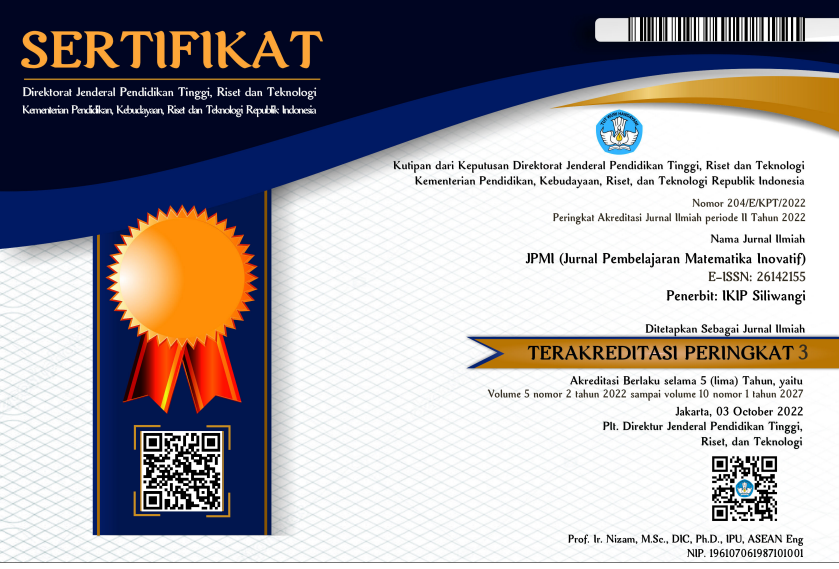Peningkatan kemampuan komunikasi matematis siswa SMP kelas VIII melalui pendekatan open ended
DOI:
https://doi.org/10.22460/jpmi.v6i4.18347Keywords:
Mathematical Communication Skills, Open Ended Approach.Abstract
This study aims to examine the achievement, improvement, implementation, and difficulty of mathematical communication skills and the achievement of learning interests of junior high school students through learning using an Open-Ended approach. The method in this study was an experimental method with two class groups, namely the experimental class and the control class; the research design was in the form of pretests, posters, and normalized gain tests. The research test instrument consists of 5 questions on mathematical communication skills in the form of descriptions and questionnaires of student learning interests. The research data were obtained from the results of pretests, posttests, and normalized gain tests, which were processed through normality tests, mann-whitney tests using IBM SPSS 23 software, as well as postes tests for student learning interests processed through normality tests, and homogeneity tests, t-tests using IBM SPSS 23 software. The research data showed that the experimental group's mathematical communication skills increased, while the control class did not.
References
Assabanny, M. N., Sopian, I., Hendriana, H., & Zanthy, L. S. (2018). Penerapan pendekatan open-ended untuk meningkatkan kemampuan pemecahan masalah matematik siswa MTs. JPMI – Jurnal Pembelajaran Matematika Inovatif, 1 (4), 637-646. https://journal.ikipsiliwangi.ac.id/index.php/jpmi/article/view/1122
Capraro, M., Capraro, R., & Cifarelli, V. (2007). What are students thinking as they solve open-ended mathematics problems? In D. K. Pugalee, A.Rogerson, & Schnick (Eds.), Proceedings of the ninth international conference of Mathematics Education in a Global Community Charlotte, NC: The University of North Carolina., pp. 124-128. https://www.researchgate.net/publication/242096594_what_are_students_thinking_as_they_solve_open-ended_mathematics_problems
Firdaus, As'ari A. R., & Qohar, A. (2016). Meningkatkan kemampuan berpikir kreatif matematis siswa SMA melalui pembelajaran open-ended pada materi SPLTV. Jurnal Pendidikan, 1(2), 227±236. https://doi.org/10.20956/jmsk.v15i2.5719
Hendriana, H., & Soemarmo, U. (2014). Penilaian pembelajaran matematika. Bandung: Refika Aditama.
Hidayat, W., & Aripin, U. (2023). How to develop an e-LKPD with a scientific approach to achieving students'mathematical communication abilities?. Infinity Journal, 12(1), 85-100. https://doi.org/10.22460/infinity.v12i1.p85-100
Kadarisma, G. (2018). Penerapan pendekatan open-ended dalam meningkatkan kemampuan komunikasi siswa SMP. ANARGYA: Jurnal Ilmiah Pendidikan Matematika, 1(2), 77–81. https://.umk.ac.id/index.php/anargya/article/view/2570
Kusmaryono, I. (2017). Analysis of narrative mathematical questions on textbooks based on solo taxonomy and mathematical power. Daya Mat. J. Inov. Pendidik. Mat, 5(3), 299–314. https://ojs.unm.ac.id/JDM/acticke/view/4839
Murni. (2013). Open-Ended approach in learning to improve students thinking skills in Banda Aceh. International Journal of Independent Research and Studies, vol. 2, no. 2, pp 95-101. https://journaldatabase.info/articles/open_ended_approach_learning_improve.html
Naibaho, T. (2022). Penguatan literasi dan numerasi untuk mendukung profil pelajar pancasila sebagai inovasi pembelajaran matematika. Sepren, (October), 111–117. Retrieved from https://jurnal.uhn.ac.id/index.php/sepren/article/view/841
Noor, N. L. (2020). Peningkatan kemampuan komunikasi matematis peserta didik melalui open ended problem. ELEMENTARY: Islamic Teacher Journal, 8(2), 209–224. https://journal.iainkudus.ac.id/index.php/elementary/article/view/8138
Rochmanto, W. (2014). Pengaruh pendekatan open-ended terhadap kemampuan berpikir kreatif matematis siswa sekolah dasar kelas V. Mimbar Sekolah Dasar, 2(2), 234–242.
Ruseffendi, E. T. (2010). Dasar-dasar penelitian pendidikan dan bidang non-eksakta lainnya. Bandung: Tarsito.
Santika, M. (2019). Peningkatan efektivitas berkomunikasi dan hasil belajar siswa kelas IV SD pada pembelajaran IPA melalui model open ended. Jurnal Pemikiran Dan Pengembangan Sekolah Dasar (JP2SD), 7(1), 30–37. https://ejournal.umm.ac.id/index.php/jp2sd/article/download/8635/6602/23336
Suryadi. (2017). Efektivitas pendekatan open-ended pada pembelajaran matematika untuk meningkatkan kemampuan berpikir HOTS matematis siswa SMP. Jurnal Cendekia: Jurnal Pendidikan Matematika, 7(1), 421–431. https://www.j-cup.org/index.php/cendikia/article/view/1911
Wanelly, W., & Fauzan, A. (2020). Pengaruh pendekatan open ended dan gaya belajar siswa terhadap kemampuan berpikir kreatif matematis. Jurnal Basicedu, 4(3), 523–533. https://jbasic.org/index.php/basicedu/article/view/388
Wardhana, I. R., & Lutfianto, M. (2018). Analisis kemampuan komunikasi matematis siswa ditinjau dari kemampuan matematika siswa. Union, 6(2), 356818. https://jurnal.ustjogja.ac.id/index.php/union/article/view/2213
Zakasyi, W. (2017). Penelitian pendidikan matematika. Bandung: PT. Refika Aditama.
Zanthy, L. S. (2016). Pengaruh motivasi belajar ditinjau dari latar belakang pilihan jurusan terhadap kemampuan berpikir kritis mahasiswa di STKIP Siliwangi Bandung. Teorema, 1(1). https://jurnal.unigal.ac.id/index.php/teorema/article/dowload/540/458.
Downloads
Published
Issue
Section
License
Copyright (c) 2023 JPMI (Jurnal Pembelajaran Matematika Inovatif)

This work is licensed under a Creative Commons Attribution-ShareAlike 4.0 International License.
The author is responsible for acquiring the permission(s) to reproduce any copyrighted figures, tables, data, or text that are being used in the submitted paper. Authors should note that text quotations of more than 250 words from a published or copyrighted work will require grant of permission from the original publisher to reprint. The written permission letter(s) must be submitted together with the manuscript.
















